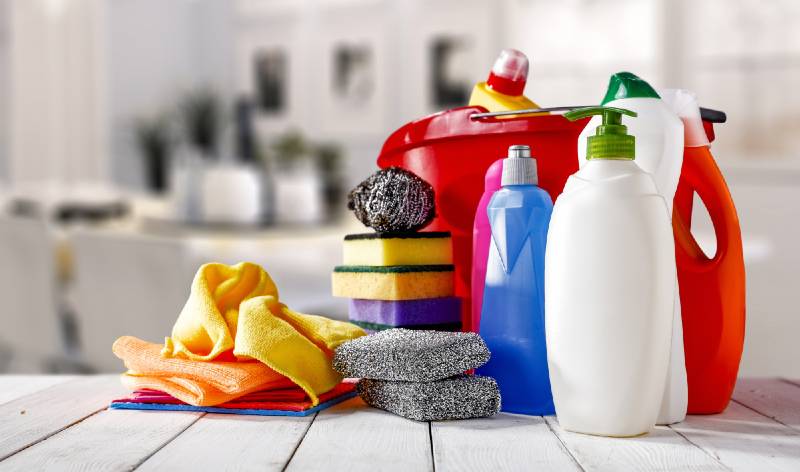
25Feb2022
Know What Green Cleaning Product Labels Really Mean
Green cleaning products have created a lot of buzz in the global market. People are heading towards environmentally-friendly cleaners that contain non-toxic fumes, harmful chemicals and other hazardous ingredients. But, are these products really ‘Green’?
Have you ever checked the labels and certifications while shopping for them? It is easy for companies to play with fancy and trending names and make customers fool. Whether you prefer green cleansers or eco-friendly ones, make sure you read and understand labels to lead a sustainable life.
You can also ask professionals regarding green cleaning practices before booking a detailed end of lease cleaning in Melbourne.
Here is a complete guide on green cleaning products to discover more about labels and bring only eco-conscious cleaning sprays and solutions at home.
What Are Green Cleaning Product?
The main objective of these cleaning solutions and sprays is to keep the environment and human beings healthy and free of toxins. Exposure to harmful chemicals can potentially cause damage to human bodies, animals, water, air and the entire ecosystem. Green cleaning product simply reduces environmental impact and helps you achieve effective outcomes. However, selling traditional cleaning sprays in the new packaging and adding the word ‘Green’ is a new gimmick by companies to mislead shoppers because these products are in high demand. It is good to read labels and check every detail before buying them. Here are some common ingredients available in toilet cleaners, stain removers, mould cleaner and glass cleaning products. Such fancy labelled products can help you clean a smelly drain, walls, carpets, appliances, and other surfaces with ease. But, you should avoid buying these products if you read the following names on the label:- Sodium Hydrogen: This chemical can irritate your eyes.
- Hydrochloric Acid: It can cause a serious burning sensation on the skin.
- Triclosan: Affects mitochondria, the powerhouse of human cells.
- Sodium Laureth Sulfate: Lead to skin allergies.
What Does ‘Non-Toxic’ Mean?
Have you ever noticed the ‘Non-toxic’ term on a cleaning product? It claims that the cleaning solution has not been linked to any serious health effects in the short and long run. But, these are buzzwords, and any product can use this as a trick to attract more customers. You can check the ingredients and Google them if you have doubt.Are ‘Organic’ Cleaning Products Genuine?
The term “Organic” used on the labels can be confusing, and they are not strictly regulated. You may find certain products with a certified organic seal that met a few standards, such as never using GMOs or ignoring synthetic fertilisers. However, you need to be careful while identifying vague or generic claims on cleaners, such as “eco-friendly”, “eco safe”, “green” and “organic, also known as greenwashing. You can buy products certified via Good Environment Choice Australia (GECA). This gives confidence that the cleaners you are bringing are trusted and environmentally safe. Many professional end of lease cleaners in Melbourne also use certified green cleaning solutions to give the highest standard of service without causing any harm to the environment.What Does Bio-Based Cleaning Products Mean?
Finding such terms on the cleaning product labels are common these days. These are the earlier developed ingredients using fossil fuels but are now made from sustainable or biological products. If you buy any green cleaner, make sure you check the label. If you see ‘bio-based’ on any product, read the percentage before purchasing. The concept behind promoting such products is that they minimise the dependency on petroleum-based products and reduce the basic needs for fossil fuels.What Are GECA-Certified Cleaners?
When a cleaning product is GECA-certified, you can be sure that it has been assessed to meet human health, environmental and ethical impact criteria. You can buy products that include GECA (Good Environment Choice Australia) certification, such as:- They are better for the environment
- Lower waste generation and resource consumption
- Phosphorus free
- Less harmful chemicals
- Enhanced Biodegradability
- Reduced VOC Content
- Support natural sourced palm oil, etc.
Homemade Eco-friendly Products
You can use products like:- White vinegar: It can be used to prepare a multi-purpose cleaning agent that can help you clean almost all surfaces.
- Baking soda: It is a natural deodoriser and can help you kill germs and bacteria from different surfaces.
- Lemon: It can be used as a natural disinfectant and can remove stains as well.
- Hydrogen Peroxide: Remove stains, grime, and mould from almost all surfaces.
- Borax Powder: You can remove grime, grease and other stains using this product.


